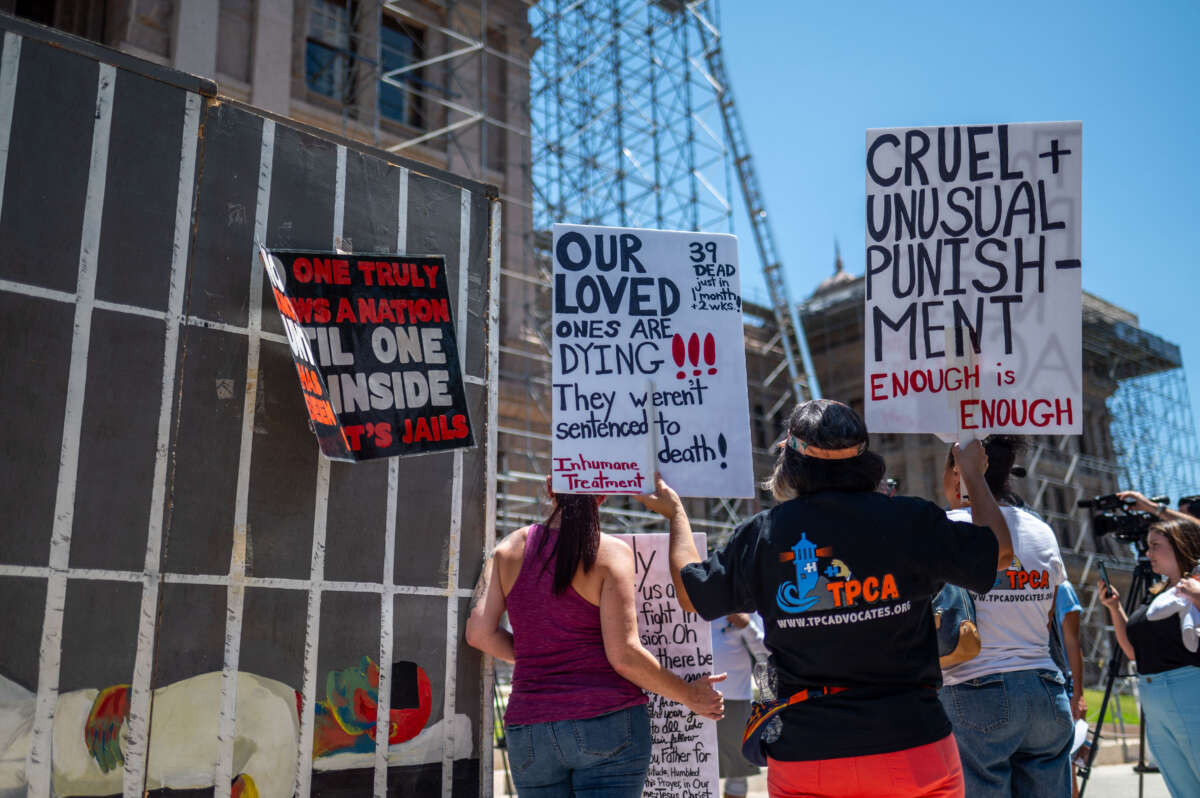Did you know that Truthout is a nonprofit and independently funded by readers like you? If you value what we do, please support our work with a donation.
On Monday, a group of Democratic lawmakers sent a letter to the chair of the House Oversight Committee demanding an investigation into the deaths of dozens of incarcerated people this summer, which advocates have attributed to excessive heat and subpar conditions in prisons.
The letter was sent by Democratic Reps. Jamie Raskin (Maryland), Greg Casar (Texas), Jasmine Crockett (Texas), Alexandria Ocasio-Cortez (New York), Cori Bush (Missouri), Katie Porter (California) and others. In it, the lawmakers request that House Oversight chair Rep. James Comer (R-Kentucky) open a formal inquiry into the deaths, writing that the conditions in Texas state prisons in particular — around 70 percent of which are without air conditioning or are only partially air-conditioned — are unacceptable.
The Democrats also questioned whether some of the deaths due to Texas’s current heat wave could have been prevented.
“Our planet recently experienced the hottest month ever recorded, with Texas and other southern states measuring some of the hottest temperatures on Earth,” the Democratic lawmakers wrote. “The capacity of prisons and jails to adequately prepare for and provide resources to meet the increasingly extreme weather caused by climate change deserves immediate attention from this Committee.”
The lawmakers noted that many Texas state legislators have the “mindset that allowing inmates to suffer from excessive heat is appropriately ‘tough on crime.'”
“This refusal to implement necessary cooling mechanisms, however, places both inmates and staff at risk for severe heat-borne illnesses, nausea, dizziness, and even death,” the lawmakers went on.
According to an analysis from The Texas Tribune, at least 41 people have died while incarcerated in Texas prisons this summer, with 12 people dying of cardiac arrest or heart failure and the remaining 29 dying of unknown causes. (Autopsies for many of the deaths are currently pending.) That number is likely an undercount, as Texas prisons have up to 30 days to report the death of any incarcerated person.
Advocates for incarcerated people and family members of the deceased say the deaths are likely the result of excessive heat and subpar conditions in prisons. The Tribune’s analysis examined deaths that took place “in uncooled prisons on days when the regions’ outdoor heat indices were above 100 degrees.”
An analysis from Nexstar last month found that 135 deaths have occurred in Texas Department of Criminal Justice (TDCJ) prisons since June 1. Of those deaths, custodial death reports suggest 51 were the result of sudden and unforeseen medical distress.
TDCJ hasn’t attributed any of this year’s deaths to heat, and claims no one has died in prison due to excessive heat since 2012.
Even in prisons in which some areas are air-conditioned, it’s likely that incarcerated people are still suffering from the heat, as air-conditioned areas are not always available due to short staffing at prisons, an anonymous prison official told The Tribune.
Family members of incarcerated people who have died or suffered as a result of improper temperature management in prisons have also called for action.
Cece Perez, whose fiance Martin Martinez is currently incarcerated, told The Associated Press that he reported “wak[ing] up gasping for air like somebody is suffocating him or sitting on his chest.”
Speaking at a rally regarding prison conditions in July, Tona Southards Naranjo, who says her son died in prison this year due to excessive heat, blasted the state for not doing more to protect people who are incarcerated.
“They’re cooking our inmates in the Texas prison system,” Southards Naranjo said.
Press freedom is under attack
As Trump cracks down on political speech, independent media is increasingly necessary.
Truthout produces reporting you won’t see in the mainstream: journalism from the frontlines of global conflict, interviews with grassroots movement leaders, high-quality legal analysis and more.
Our work is possible thanks to reader support. Help Truthout catalyze change and social justice — make a tax-deductible monthly or one-time donation today.
